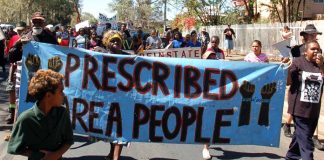On Thursday May 21 Indigenous Affairs Minister Jenny Macklin announced her intention to use Intervention powers to permanently acquire the Alice Springs town camps. Her move unleashed an avalanche of racism against Tangentyre Council and the residents of the camps.
Despite ongoing, criminal levels of government neglect, Minister Macklin posed the town camp take-over as “saving the children”—the same lie the Liberals used to justify the Intervention in the first place.
But Tangentyere Council is made up of representatives elected by the residents of each town camp. It was born out of the struggle of Aboriginal people, forced to squat on the fringes of Alice Springs.
The council won “special purposes leases in perpetuity” through the 1970s and 80s. They have built 200 houses and 70 tin sheds for the 2000-3000 people who live on the camps. Tangentyre provides the camps’ social services, including the delivery of water-drums to camps still refused access to running water.
Tangentyere is disgracefully under-funded, patching together grants from more than 30 organisations each year. Recent, savage cuts include the defunding of Community Development Employment Projects (CDEPs), and an end to the “return to country” program, which had helped more than 1900 people get home from Alice Springs.
In the May budget, Jenny Macklin re-badged the Intervention “Closing the Gap NT”. But the core agenda—attacking Aboriginal rights—is unchanged. Communities have already been held to ransom with housing funding. A small minority have signed the 40 year leases demanded by the government. But no new housing has been built apart from the compounds for Government Business Managers and other public servants.
Jenny Macklin has promised $100 million to build and upgrade housing and infrastructure in the town camps, but only if the residents represented by Tangentyere agree to sign away their land. The council would be stripped of any say over the use of the money and all housing stock would be handed to NT Housing, the distrusted, mainstream public housing agency.
William Tilmouth, director of Tangentyere, explained their refusal to cede control to CAAMA Radio in Alice Springs:
“What will happen to people living in tin sheds? Those 70 tin sheds will be bulldozed and I don’t think they’ll be building 70 new houses.”
“NT Housing management create a lot of homelessness through failed tenancies in urban housing and the people always come and live on town camps, that’s their fallback position… if you get evicted from a town camp the only fallback position is back into the scrub, from whence you came.”
Homelands
In May, the NT government fell into line with Federal government policy, announcing it will only provide substantial services to communities deemed “economically viable”.
The new “Territory growth towns” model will starve funding from most of the 580 Aboriginal communities and homelands in the NT, forcing people into 20 “hub towns” controlled by government administrators.
These hubs will be forced to sign leases. Barbara Shaw from the Intervention Rollback Action Group in Alice Springs explained the logic, “It’s a return to the mission days where people were herded into towns so the government could assimilate them”.
The Western Australia Liberal government is also set to introduce legislation which would allow compulsory acquisition if communities do not sign over control of community housing.
Macklin has announced that Labor intends to restore the Racial Discrimination Act (RDA) in October. But like the apology to the Stolen Generation, this is all about appearances.
The substance of the Intervention will be left in place by classifying Intervention policies as “special measures” under the RDA—positive discrimination, in the interests of, and with the “informed consent” of the prescribed area peoples.The “special measures” classification is an extreme act of political deceit. How many more times do Aboriginal people need to say no to the Intervention?
The Prescribed Area People’s Alliance have led demonstrations and issued countless statements over the last two years. Even the government’s own review reported widespread pain and anger, and recommended an end to compulsory income management.
The threat to Tangentyre and the push to “growth towns” have re-galvanised attention on the Intervention. Within four days, a statement supporting Tangentyre and the right to self-determination was signed by the national CFMEU, SA Unions, ANTaR, the NSW Reconciliation Council, Aboriginal leaders, all NSW Greens MPs, and hundreds of individuals.
Macklin’s has set June 29 as deadline for Tangentyre to sign over the town camps. If Tangentyere is forced to sign no Aboriginal organisation will be safe.
Mass rallies on June 20 will demand Hands off Tangentyre and No to the Intervention. Then the ALP National Conference in Sydney at the end of July will be an important focus as the campaign mobilises against Macklin’s Intervention offensive.
Get involved in the campaign! www.stoptheintervention.org or rollbacktheintervention.wordpress.com
By Paddy Gibson





